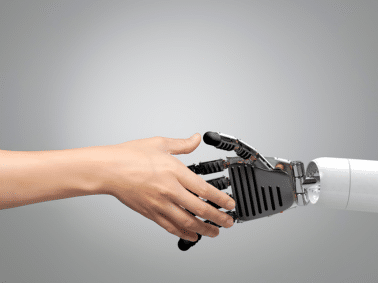Artificial Intelligence (AI) is poised to revolutionise the adult social care sector, transforming how care professionals support individuals while significantly reducing their administrative burden. One notable example of this transformation is Solihull Council’s introduction of Magic Notes, an AI-powered software designed to help social care staff focus more on the people they care for than on paperwork. This tool is just one of many ways AI is changing the face of adult social care by improving efficiency and care outcomes.
Magic Notes: Enhancing Care Through AI
Magic Notes is one of the most innovative AI solutions in social care today. This AI-powered software eliminates the need for social care staff to spend hours manually inputting data. Magic Notes generates instant summaries and drafts reports for staff by automatically recording and transcribing discussions during care visits. This automation reduces administrative tasks by up to 65%, allowing care workers more time to focus on direct, meaningful interactions with the individuals they support.
AI for Better Information Access
AI is improving efficiency in social care and enhancing information access. With AI-powered language processing tools, social care teams can quickly sift through large amounts of data. These advanced search tools enable faster decision-making and allow professionals to respond more effectively to the needs of the people they support. Care providers can offer more timely and accurate interventions by having easier access to critical information.
Optimising Resource Allocation with AI
In the world of adult social care, time is often a scarce resource. AI-driven scheduling systems are already helping to make the most of this precious time. These systems analyse variables like location, urgency, and staff availability to optimise home care visit schedules. This results in carers spending less time on the road and more time supporting those who need it most. Through better resource allocation, AI ensures that time is spent where needed most—on the people receiving care.
Empowering Human Connection
One of the most significant benefits of AI in social care is its ability to free up professionals to focus on what truly matters: building human relationships. By automating repetitive tasks, AI allows care workers to spend more time on direct, face-to-face interactions with individuals, improving the quality of care. Rather than replacing human care, AI enhances the ability of professionals to offer more compassionate, personalised support.
Supporting Decision-Making with AI Insights
AI not only reduces administrative burdens but also helps with decision-making. Many AI tools can now offer suggestions for the next steps or follow-up actions based on the data collected during care visits. These recommendations provide care professionals with valuable insights that can help inform decisions, but human oversight remains crucial. While AI can streamline processes, the judgment and experience of social care professionals are still essential for interpreting the information and ensuring the best outcomes.
The Financial Benefits of AI in Social Care
AI solutions such as Magic Notes not only improve efficiency but also offer the potential for significant cost savings in the social care sector. AI tools can save councils and care providers billions of pounds by reducing administrative work and optimising schedules. These savings can be reinvested into improving care quality and expanding services, benefiting the care professionals and those they support.
Challenges of AI in Adult Social Care
While AI offers many benefits, its integration into adult social care is not without challenges. One of the most significant concerns is data privacy. Social care deals with highly sensitive personal information, and ensuring this data is protected is essential for building trust in AI systems. Ethical considerations such as data security, algorithmic bias, and transparency must be addressed to ensure AI is used responsibly.
Another challenge is the fragmented nature of the social care sector. Many AI tools are still in the pilot stage, and scaling these solutions will require significant investment in technology infrastructure and collaboration across the sector. Successful implementation will depend on the sector’s ability to work together to overcome these barriers.
Ethical AI: Augmenting, Not Replacing Human Care
It is crucial to emphasise that AI should never replace human care workers. The role of AI in adult social care is to support, not replace, the professionals who provide compassionate care. AI should be viewed as a trusted assistant, complementing human judgment and skills. The human touch is irreplaceable in social care. AI must be designed to work harmoniously with the front-line professionals, enhancing their ability to deliver high-quality care.
Looking Ahead: The Future of AI in Social Care
The future of AI in adult social care is filled with exciting possibilities. As technology advances, AI may create personalised care plans or predictive tools that help identify risks early, improving individual outcomes. However, for AI to fulfil its potential, it must be integrated thoughtfully, with a strong focus on ethical practices, user-friendly design, and continuous evaluation.
By embracing AI responsibly, the social care sector can unlock its transformative power, enhancing the lives of those receiving care and the professionals supporting them.
Conclusion
AI can potentially transform adult social care by streamlining processes, empowering care staff, and improving outcomes for individuals. With tools like Magic Notes, care workers can focus more on providing compassionate, personalised care rather than getting bogged down in administrative tasks. By addressing the challenges of data privacy, ethical use, and sector-wide collaboration, AI can help meet the growing demands of an ageing population while maintaining the highest standards of care and compassion.



